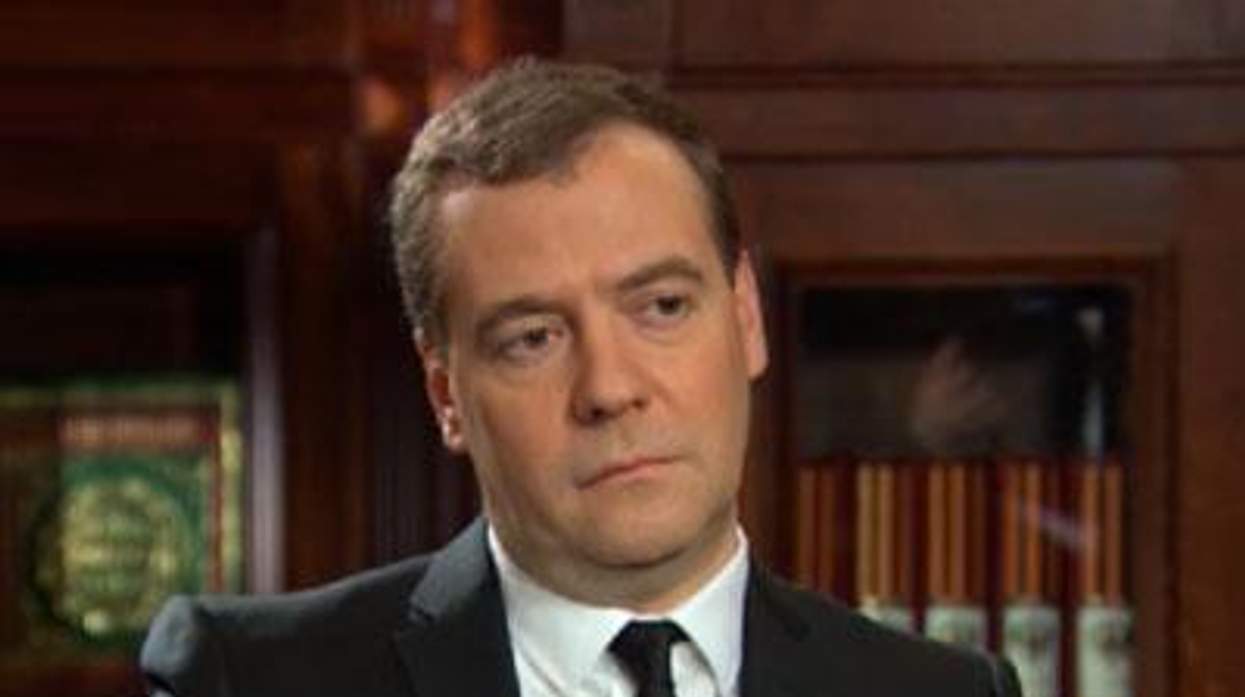CNN's Christiane Amanpour sat down with Russian prime minister Dmitry Medvedev Wednesday for a lengthy interview that touched on the Russian economy, terrorist threats to the Sochi Olympics, and the state of gay rights in the country.
A transcript of the interview reveals a conversation that seemed tense at times, with Medvedev telling Amanpour to "wait a minute" several times. Although the bulk of the interview was dedicated to discussing the security surrounding the 2014 Sochi Winter Olympics and Russia's international relations, Amanpour closed the interview with a series of direct questions to the prime minister about whether or not LGBT Russians are rightfully terrified of persecution under the country's ban on "propaganda of nontraditional sexual relations" in areas visible to minors.
Acknowledging that the law does not technically outlaw homosexual acts -- just any positive depiction or discussion that contends LGBT people are "normal" or equal to straight people -- Amanpour pressed the prime minister, noting, "Things do not look good on the freedom front here in Russia."
Medvedev essentially dismissed Amanpour's reports of LGBT Russians who are fleeing the country, afraid for their safety, claiming that the outrage is manufactured from nations outside of Russia.
"I believe that this problem [of homosexuality] in our country is the concern of the significant part of people," Medvedev said through a translator.
He also falsely claimed that the law -- which he called a draft law, despite the fact that President Vladimir Putin signed the draft bill into law last June -- is not actually being enforced.
"I haven't almost heard the -- that this law was applied in practice," Medvedev said. "There are many talks, but no application of the law, practical application."
Apparently the prime minister is unaware of several cases in which demonstrators have been arrested and charged with violating the law. By mid-December, three activists had been convicted of spreading "gay propaganda" and fined for the crime, according to The New York Times. Last November a Russian newspaper was investigated for possibly violating the law after it published a report on a teacher who was fired for being gay. And as early as November 2012, Russian LGBT activists were being arrested and fined for violating similar local laws, which inspired the nationwide legislation.
But Medvedev, who told Amanpour that he is an "active surfer" of the Web and spends a good deal of time looking at commentary from Russians, contended he hadn't heard directly from any LGBT Russians claiming they've been oppressed. Of course, reporting that oppression would likely be a violation of the "gay propaganda" ban, but Medvedev didn't mention that catch-22.
"I have seen no application in the internet from the Russian sexual minorities where they would write that their rights are violated," Medvedev told Amanpour. And you understand that in this country, we have the full freedom of communication. ... And I have never met a single application of the so-called nontraditional sexual minorities communities, I mean, Russian, to the authorities, saying that their rights have been violated."
"But the situation caused some disturbance in other countries," he continued. "So I believe that this problem is partially non-existent. If we see that the rights of this or that category of our population are violated, doesn't matter which category it is, of course we will have amendments to our laws. But so far, there is no problem about those matters that you speak about, no problem at all."





































































Charlie Kirk DID say stoning gay people was the 'perfect law' — and these other heinous quotes